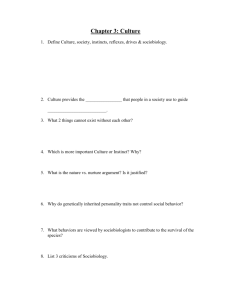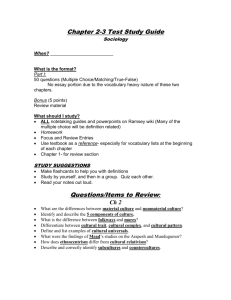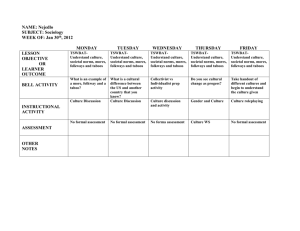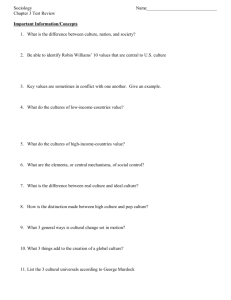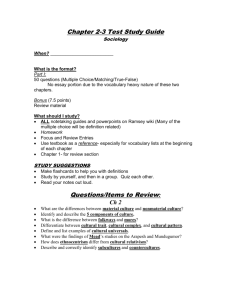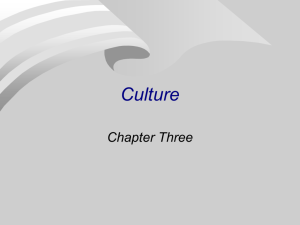Sanctions and Cultural Relativism
advertisement
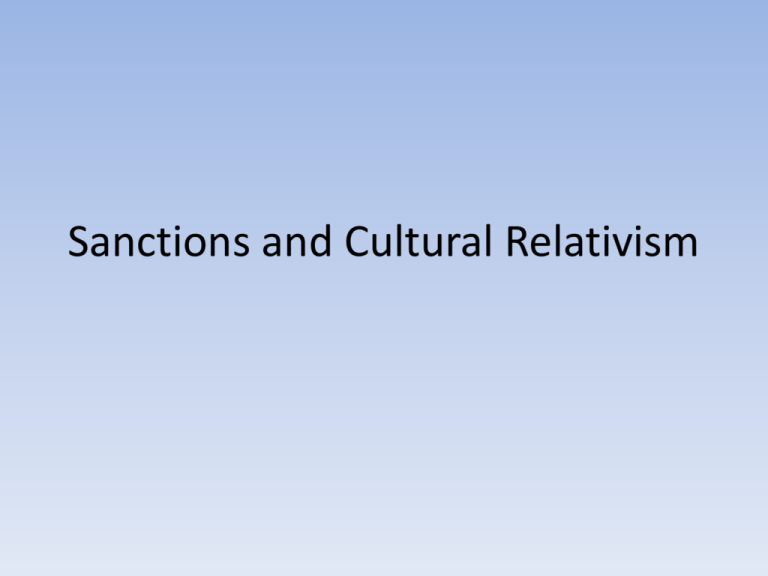
Sanctions and Cultural Relativism Values • A person’s ideas of what is desirable in life • They are the standards by which people define what is good and bad, beautiful and ugly • Values underlie our preferences, guide our choices, and indicate what we hold worthwhile in life Cultural Values • Individual cultures emphasize values which their members broadly share. One can often identify the values of a society by noting which people receive honor or respect. In the United States of America, for example, professional athletes at the top levels in some sports receive more honor (measured in terms of monetary payment) than university professors. Surveys show that voters in the United States would not willingly elect an atheist as president, suggesting belief in a God as a generally shared value there. An Overview of U.S. Values • • • • • • • • • • • • • • • Achievement and success Individualism Activity and work Efficiency and practicality Science and technology Progress Material comfort Humanitarianism Freedom Democracy Equality Racism and group superiority Education Religiosity Romantic love Emerging Values in the U.S. • • • • • Leisure Self-fulfillment Physical fitness Youthfulness Concern for the environment Norms – societal rules – What might be some examples of norms? • What we don’t do: Spitting in public, stabbing people, dueling over arguments, eating corpses. • Urinal practices – Norms are rules which govern our society – through these rules we know what to do, when to do it, and what is just plain NOT ALLOWED OR OK in our society. – They give us structure and safety (know that we can go around outside without a knife, as the police and our community norms protect us from violence) • Sanctions: reactions people get for following or breaking norms (expressions of approval or disapproval) Types of Sanctions • Positive—smile, high five, money, trophy. • Negative— frown, fine, smack, middle finger. Types of Sanctions • Material— money, trophy, fine, jail sentence. • Non-material— smile, frown, pat on the back, spanking. Moral holidays: • Sometimes people find norms stifling • We provide breaks from the norms, where activities which would normally lead to arrest or sanction can be allowed Moral holidays, like Mardi Gras, usually center around getting drunk and being rowdy Three types: Folkways, Mores (More – ays) and Taboos • Folkways - the patterns of conventional behavior in a society, norms that apply to everyday matters. They are the conventions and habits learned from childhood. – (What’s rude = folkways) – Wash your hands after eating – Don’t burp – Don’t spit – Walk on sidewalks, ride on streets • Picking your nose in public in western culture is seen as disgusting and wrong. • Staring at a person sitting across from you on the bus, standing really close to people, facing towards everyone in the elevator instead of at the door, having a conversation with yourself in a public area.. – ENFORCED BY: gentle social pressure and imitation. • Breaking or questioning a folkway does not cause severe punishment, but may cause the person to be laughed at, frowned upon, or scolded. • In western culture, folkways include wearing gender-appropriate clothing, respecting the privacy of strangers, and eating food with the proper utensil. Norms continued… • Mores (More ays) – more strictly enforced than folkways – more strongly held norms or customs (not just impolite, but actually scandalous or upsetting – These derive from the established practices of a society (but are also often enforced by written laws) • Wear clothes, be honest, be sexually pure – (What’s right and wrong = mores) – Lying, cheating – not always against the law – but strictly enforced. – Drug use, sexual promiscuity, and extreme styles of dress. – ENFORCED BY: more serious sanctions – broken relationships, socially ostracizing people, not having business relationships, enforcement by the law (fines and jail if serious enough) Norms continued… • Taboos- form the subset of mores that forbid a society's most outrageous behaviors, such as incest and murder in many societies. – ENFORCED BY: death, exile, severe jail sentences • What are some of the major taboos in American society? – Incest, Child Murder or Rape, Cannibalism, Eating the dead, intercourse with animals, child molestation, etc. Group Activity: – Watch “Mona Lisa Smile”/”Gran Torino” – Create a list of norms (or add to your existing list) so that you have at least ten. – Then label or group your list into the three types: folkways, norms, and taboos. Cannibalism • Cannibalism is one of the major taboos in Western culture, and indeed, most cultures on the planet(Some tribes in Polynesia and Papua New Guinea will eat their dead, but very rare.) • Despite the revulsion accompanied with it, there are many examples of cannibalism throughout Western cultural history. – When? • Donner Party ( a group of American pioneers who set out for California in a wagon train. Delayed by a series of mishaps, they spent the winter of 1846– 47 snowbound in the Sierra Nevada. Some of the immigrants resorted to cannibalism to survive, eating those who had succumbed to starvation and sickness. • Polar expeditions and castaways or shipwrecks – Harsh conditions: societal norms can change in different (harsh) societal circumstances. – http://whyfiles.org/164cannibal/2.html – Watch “Alive” • Cultural relativism: –belief that cultures should be judged by their own standards (and not be compared to others) Female Genital Mutilation (FGM) • Read article

